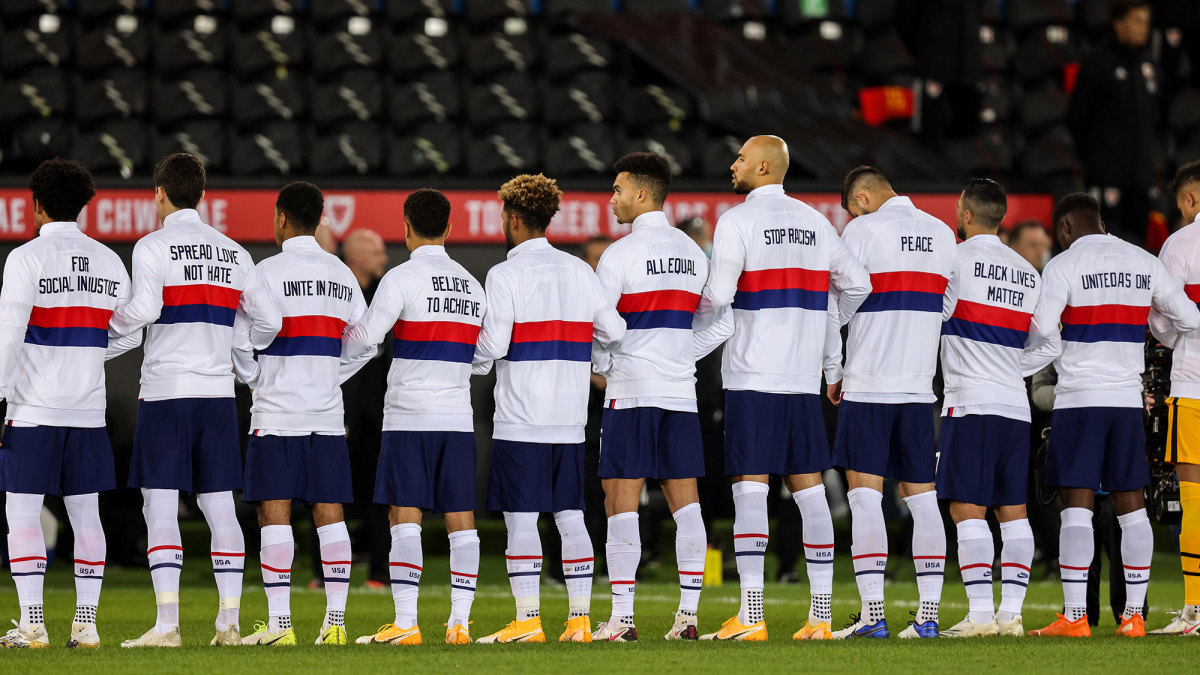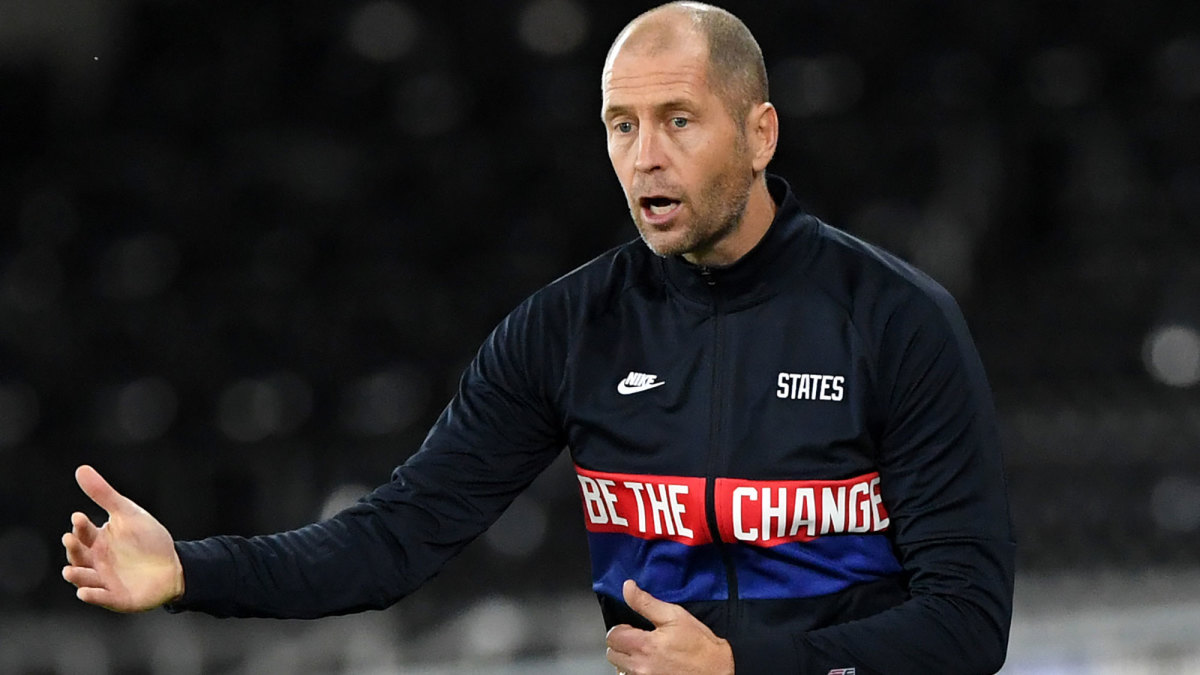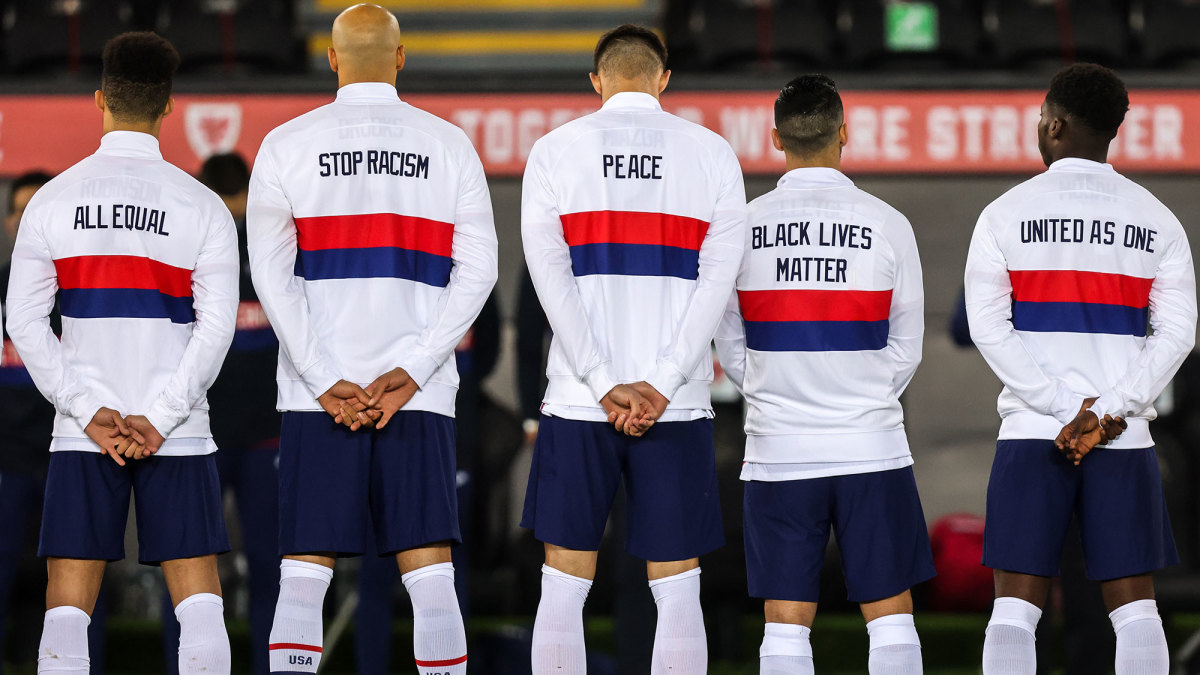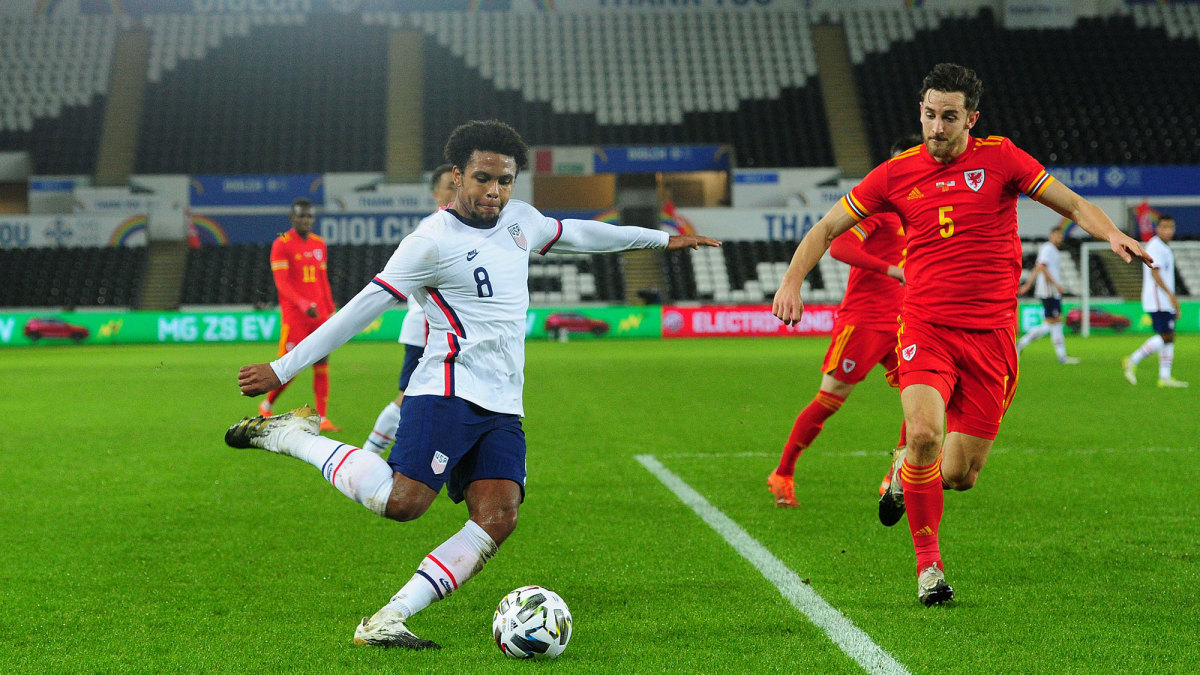More Than Just Jackets: USMNT's Message a Product of a Diverse Group's Process
This maddening, memorable year has demonstrated that it’s almost impossible to separate sports from social issues and politics. Sports are an aspirational extension of our society, not an escape.
In no sporting environment is that more true than on a national team. A team wearing its country’s colors is no collection of disparate contractors. Its members are fueled by pride, united by a common heritage or culture. And they represent not only all those people bonded by the same, but a literal political entity. They are a tangible extension of a nation, and often all that nation represents.
That’s been on Weston McKennie’s mind this year. It’s been a year of tragedy, protest and division, and the U.S. national team and Juventus midfielder, who hails from Dallas, has thought a lot about what it means to be a Black American and how it feels to play as an extension of a divided America. Last month, he released a video in which he said, “I’m representing a country that possibly doesn’t even accept me just for the color of my skin,” and he vowed to use his growing platform to raise awareness and affect change.
Asked by Sports Illustrated whether any circumstances might arise that would leave him reconsidering his place on the national team, McKennie said, “If things got out of hand and things came to fruition where it was like, the national team doesn’t support the movement, or the national team doesn’t try to actively show that they ... support the players that are going through situations like this, then I would, in my right mind, I probably would have a word first.
“I would have a word with my other teammates as well,” he continued. “First of all, because I’m battling on the field with those guys, and I would have a word. Initially, if I didn’t feel comfortable with the whole situation, then I could possibly, yeah, decide, 'Hey, I’m not coming into this camp.’”
On Thursday evening in rainy Swansea, Wales, McKennie stepped onto the field with his USA teammates for the first time in 2020, wearing both his commitment to the cause and a symbol of the support he and his unified colleagues received. At that point, it didn’t seem like there was any reason to fear that McKennie’s hypothetical might ever come to pass. The players, as well as coach Gregg Berhalter and U.S. Soccer staff in Wales and back in Chicago, had worked together for some time to execute their sartorial pre-game statement. Each member of the U.S. squad—starters, reserves and coaches—wore an anthem jacket that read “BE THE CHANGE” across the front. On the back, the players were afforded the opportunity to send their own personal message. Although U.S. Soccer repealed its policy requiring players to stand for the anthem in June, they stood on Thursday with arms linked.

The team’s final discussion of the pregame plan was held Tuesday afternoon, once every player had arrived at camp in Cardiff, and USMNT equipment manager Kyle Robertson was working into Wednesday night to prepare the jackets. The foundation for the statement, however, was months in the making.
“I’m proud of the fact that the players came together and thought long and hard about how they want to activate for social injustice, and they came up with ‘Be the Change,’” Berhalter told reporters following Thursday’s 0-0 draw. “The guys really take it seriously and really believe that if we want change, it’s up to the individual to take responsibility for it. It’s a great message, and I’m really proud of the guys in that moment.”
Thats what McKennie has been doing—sticking his neck out, demanding that he be seen as a person as well as a player, and holding society to account. It’s not the safe option, but it’s the one that feels right and the one that might make a difference. In addition, goalkeeper Zack Steffen, still only 25, already has launched VOYCEnow, a foundation seeking to unite athletes interested in philanthropy, fundraising for American youth, mentorship and advocacy.
“As a goalkeeper for the United States men’s national team, it is the greatest honor to wear the U.S. badge on my chest. I proudly defend my team’s goal on the field, and work hard to ensure I am representing my country in the best light off the field as well. But what does it mean when the very nation I protect the goal for won’t protect its citizens who look like me,” Steffen wrote when unveiling VOYCEnow in June. “If I’m going to wear the U.S. flag, I need to know that is stands for something worth defending.”
Berhalter wore the USA crest as well, and represented his country at a World Cup. But as a white male Gen-Xer, he never had to confront the questions that McKennie and Steffen are asking. Now he’s in charge of a team that’s exceptionally diverse—a manifestation of the multicultural society the U.S. already is at its core. The 24-man squad he named for Thursday’s game in Wales and next Monday’s friendly against Panama is majority minority, and Berhalter has been working on finding the right balance between leading and listening.

“There’s a certain amount of that for sure,” he told Sports Illustrated when asked this week about whether his own background gave him pause. “Then there’s also the active support. It’s complicated. I think if you’re a person in power, I think the right thing to do is step back and let other people step up. But if you're a friend, you're just offering support.
“I don’t think the [U.S. Soccer] Federation should go to the players and say, ‘O.K., this is what you’re doing. You’re going to do this, and this is what it’s going to mean.’ You know what I mean? You have to let it sprout.”
Berhalter said that following George Floyd’s May killing in Minneapolis and the subsequent protests, he took time to speak with minority leaders and coaches in an effort to educate himself, and he began reaching out to U.S. players as well as MLS athletes at the forefront of the conversation, like Black Players for Change founder Justin Morrow. Individual conversations with national team members carried on through the summer. He said he didn’t encounter reservations about playing for the USA, but he did sense a collective desire to do something proactive. Larger, more inclusive conversations followed.
“It was about us as a group acting. It’s a tight group of guys,” Berhalter said. “These guys are aligned and they have each other’s back. It was really just talking to the Black players group and saying, ‘How are we going to share this with the rest of the team?’ After many one-on-ones, after all the supporting calls that we did, it was also now ‘Let’s get together. Let’s talk. I can tell you some of the stuff the Federation is doing, but I just want to hear from you guys. Here’s where everyone’s at collectively and how we can activate as a group.’”
Ideas were exchanged and as this month’s camp approached, Berhalter, USMNT GM Brian McBride and head athletic trainer Ron Shinault reached out to the team’s leadership council—absent a permanent captain, the players elect a leadership council for each camp—which comprised Steffen, McKennie, Christian Pulisic (who left camp before the match), Tyler Adams and Tim Ream. U.S. Soccer wanted to give the players the leeway to decide how they wanted to send their message, but also needed the time to set things in motion. There are pandemic and match-day protocols to consider, and there were multiple employees and constituencies, like Nike, for example, who might need to be involved.
What emerged from those conversations was a consideration of the subtle difference between agreement and alignment, Berhalter said. The players were in agreement—they wanted to make a statement and commit themselves to fostering change. “Be the Change” was born. But they could go about being that change in different ways. Some, like McKennie, are more outspoken. Others may feel more at ease behind the scenes. Some focus on society at large, some on issues close to home. Priorities and pressure points might differ. And that’s what brought about the blank canvas on the jackets’ back. While united in purpose, each player would have the opportunity to express his particular perspective on that purpose.
“People have different levels of comfort, and I think that was a really important conversation that we had with the guys,” Berhalter said. “Thats where guys finally really understood that everybody has their back. It’s about, listen, ‘This is how everyone’s behind us. Everyone’s behind you.’”

Personal messages were finalized once the players arrived in Wales. McKennie chose, “For Social Injustice” and Steffen displayed “VOYCEnow.” Neither Sebastian Lletget nor Richard Ledezma is Black, but the former opted for “Black Lives Matter” and the latter for “BLM.” Two 17-year-old debutants, Giovanni Reyna and Yunus Musah, went with “Spread Love Not Hate” and “United As One,” respectively. And players were welcome to leave their jackets blank as well. Konrad de la Fuente was among them. The Barcelona forward left the focus on “Be The Change.”
“One of the things was, ‘Guys, listen, everyone is supported here. If there’s a blank anthem jacket, you’re 100% supported,’” Berhalter said.
And if a hypothetical player wanted “MAGA” on the back of his jacket?
“I guess you’d want understand the why, then you’d support them. If the why’s good enough, then you’d support them,” Berhalter answered.
That support was part of a process that likely was just as important to the team as the end product. The conversations, starting with the one-on-one calls over the summer, opened up uncommonly close lines of communication for a national team, which is going to be apart much more often than it’s together.
“The internal discussions have been great within the team of supporting one another, sharing each other's beliefs and … just educating each other on ideas of how people perceive certain situations and what their opinions are on it,” Adams said this week. “Those open, difficult discussions have been really helpful for the team, I would say.”
Berhalter said, “The great part of it is that what you have is people feeling empowered, and people feel they can use their platform for good and for change, and that empowers them. And I’m really proud of them that they feel this way, because it’s a great thing to watch.”
As of Thursday, there was no word on what’s going to become of the jackets. The players might wind up keeping them or using them again. Or discussions might start on how to auction them off for charity. Whatever their destiny, McKennie said he hopes the images from Swansea made an impression.

“It’s definitely something that we’ve thought about. It’s something that we have talked with the whole group and the whole Federation about, and the beauty of it is that no matter the color of our skins or no matter the ideas—or not even the matter of who voted for who in the election— we’ve had tremendous support with this whole process, and it’s something that we’re really looking forward to showing tomorrow,” McKennie said before the game.
“We hope that it sends a message across. We kind of wanted to have our own idea and we wanted to have an idea that we all unite and can identify with, and at the same time we wanted to make it a bit personal for each person in the way that they express it. Definitely it’ll be hopefully, like I said, a powerful message tomorrow and hopefully many people can recognize that.”
Berhalter and U.S. Soccer should feel gratified that McKennie felt supported. That’s what he was looking for. It can be a complicated thing, representing a country whose direction is uncertain. And McKennie has taken on a lot this year, from speaking out on racism and injustice to taking on a leadership role with the USA and becoming the first American player at Juventus.
Berhalter said he wants McKennie and all his teammates to feel like their voices will be heard, and that he hopes this national team will represent the aspirations and diversity of the country.
“This is not the end point,” the manager said. “This is the starting point, and that’s what we made clear. When you talk about a lot of new guys in camp, this is the starting point for us and the group: to say “O.K., this is what we believe as a group.’”
